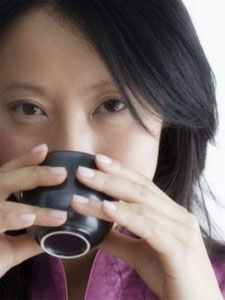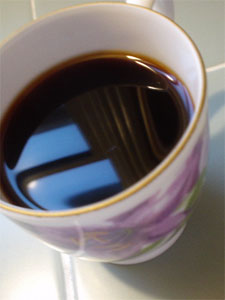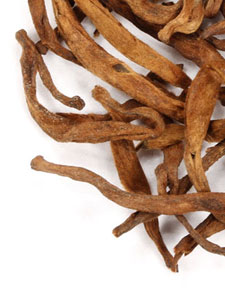On Pu Erh, The Other Tea



If I were stranded on a deserted island and could only have one type of tea with me, in unlimited supply, it would definitely be China's pu erh tea from Yunnan Province. It has all of the medicinal properties of green tea, plus other medicinal properties which are unique to pu erh alone. It has a flavor that is complex and yet much smoother and more enjoyable than a cup of a gourmet coffee. So aside from its numerous health benefits, it's just plain good!
One of the things I find so fascinating about pu erh is that it is actually a living tea, which is what makes it so unique. The living cultures within the tea are why pu erh is the only tea in the world that actually improves with age. The living, healthy microbes in the leaves smooth out the flavor of the tea over time, which is why pu erh remains drinkable and enjoyable no matter how long it is steeped. No other tea has this quality. A good cup of pu erh is so rich and dark that it's easy to mistake the tea for a cup of coffee, but once that smoothness hits the tongue, there's no mistaking pu erh for any other drink.
It's no wonder to me why pu erh has always been the choice tea of China's old aristocracy and now the business elite. Though it contains the least amount of caffeine of all the black teas, it is surprisingly invigorating, yet at the same time balancing, so no jitters like coffee. Strategists and leaders historically would drink pu erh when making important decisions that required focus. Business leaders continue this practice today, enjoying a pot of pu erh prior to meetings and negotiations. As a morning boost to start off the day, pu erh is so naturally smooth that no additives are required to enjoy a cup, unlike coffee, which few people actually enjoy plain. For some reason, however, pu erh has a reputation for not being very pleasant to the taste.
Probably the most important (and, unfortunately, the most often overlooked) factor in whether or not you enjoy your first cup of pu erh is proper brewing. It's not like other teas, and if it's not done correctly the first time, you're not likely to give it a second try. So right off the bat: YOU MUST RINSE THE LEAVES BEFORE BREWING A POT! This is paramount. The tea has been fermenting and aging many months or even years, depending on the quality of the tea, and in that time it acquires a bitter, chalky, sometimes even fishy-tasting filminess. And when most people claim not to like the taste of pu erh, it's because their first cup had this unpleasant flavor from an improperly prepared pot. So make sure you rinse the leaves properly first!
How do you do that? Simple. Just boil the water like normal, and once the water is ready just pour a quarter- or half-cup over the leaves, just enough to fully submerge them. Swish the leaves around in the water for a period of 45 seconds to a full minute, and then strain. Only then are the leaves ready for making a proper pot. And believe me, it makes all the difference in the world!
Green tea is now well-known throughout the world for its medicinal properties, but few people know the value of pu erh in this regard. Like green tea, pu erh is full of antioxidants, which helps to prevent cancer. In Chinese medicine it is held in high regard for regulating the energies of the spleen and pancreas, as well as regulating the triple-burner and overall metabolism of the body. It contains cleansing properties for eliminating toxins, and also replenishing properties for improving digestion and intestinal health.
Probably its most profound medicinal properties are in its ability to regulate cholesterol and heart disease. A blind study was conducted in France using patients with advanced cholesterol conditions, and the results were rather remarkable. The study demonstrated rather conclusively that drinking 3-4 cups of pu erh on a regular basis can lower cholesterol to the same extent as some of the most advanced medications available.
Now, I've had the opportunity to try three of Adagio's pu erh teas side-by-side. Just yesterday morning I brewed a pot of the pu erh Poe and the pu erh Dante, two basic, inexpensive teas that I would consider fair representations of the average cost-friendly pu erh on the market. Then this morning I decided to go for the gold and try the Yunnan pu erh Gold. Here are my thoughts:
The Poe: deep, rich, and full-bodied, which is what I like in pu erh. mildly spicy (think cinnamon or nutmeg, not chili peppers), slightly smokey finnish. Anyone who is looking for a coffee replacement will find both the price and the taste of this tea favorable.
The Dante: lighter bodied, a little more complexity than the Poe, very energizing (which might suggests a little more caffeine content, like a younger stock), but not quite as satisfying overall as Poe's fullness, which really is comparable to an uncommonly smooth cup of coffee. However, for people who prefer lighter bodied brews or who enjoy coffees from Latin America (slightly citrus with a bright acidity), the Dante pu erh will be your winner.
Yunnan Pu Erh Gold: Truly I was saving the best for last. This brew has all of the qualities I have come to expect in a mid to high range pu erh, and none of the weaknesses of the lower priced varieties. For instance, one of the drawbacks shared by both the Poe and the Dante is a somewhat heavy earthiness in the finish. The Yunnan Gold doesn't have this at all, and instead you get more of a clean woodsiness that tapers off into a faint apple peal flavor. It's incredibly full-bodied on the tongue, yet surprisingly light on the taste buds. It also washes with a bit of that earl grey/bergamot sweetness, indicating a delicately controlled fermentation. And everything is in balance; nothing overpowering at all. A really great tea to serve my out-of-town guests with discriminating pallets.
There are so many different varieties of pu erh on the market that the best idea is to simply explore a number of different types as you would with different wines. It's a fun process to explore and discover the complex and nuanced world of pu erh tea. Proper rinsing and brewing really makes the flavors come alive, and the health benefits alone make it worth a second look if you've tried it before. Who knows? You might even discover along the way, just as I did, that you have fallen in love!
